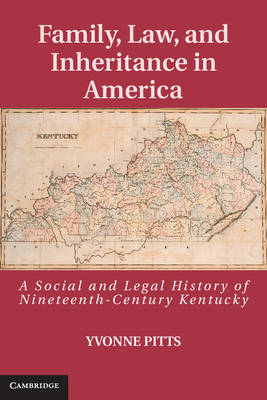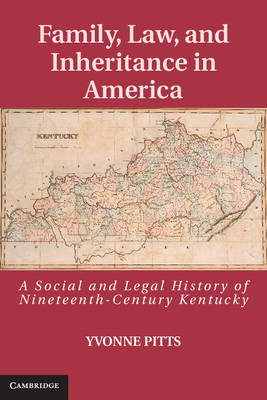
- Afhalen na 1 uur in een winkel met voorraad
- Gratis thuislevering in België vanaf € 30
- Ruim aanbod met 7 miljoen producten
- Afhalen na 1 uur in een winkel met voorraad
- Gratis thuislevering in België vanaf € 30
- Ruim aanbod met 7 miljoen producten
Zoeken
Family, Law, and Inheritance in America
A Social and Legal History of Nineteenth-Century Kentucky
Yvonne Pitts
€ 172,95
+ 345 punten
Omschrijving
Yvonne Pitts explores inheritance practices by focusing on nineteenth-century testamentary capacity trials in Kentucky in which disinherited family members challenged relatives' wills. These disappointed heirs claimed that their departed relative lacked the capacity required to write a valid will. These inheritance disputes crisscrossed a variety of legal and cultural terrains, including ordinary people's understandings of what constituted insanity and justice, medical experts' attempts to infuse law with science, and the independence claims of women. Pitts uncovers the contradictions in the body of law that explicitly protected free will while simultaneously reinforcing the primacy of blood in mediating claims to inherited property. By anchoring the study in local communities and the texts of elite jurists, Pitts demonstrates that "capacity" was a term laden with legal meaning and competing communal values about family, race relations, and rationality. These concepts evolved as Kentucky's legal culture mutated as the state transitioned from a conflicted border state with slaves to a developing free-labor, industrializing economy.
Specificaties
Betrokkenen
- Auteur(s):
- Uitgeverij:
Inhoud
- Aantal bladzijden:
- 213
- Taal:
- Engels
- Reeks:
Eigenschappen
- Productcode (EAN):
- 9781107035508
- Verschijningsdatum:
- 20/05/2013
- Uitvoering:
- Hardcover
- Formaat:
- Genaaid
- Afmetingen:
- 155 mm x 231 mm
- Gewicht:
- 498 g

Alleen bij Standaard Boekhandel
+ 345 punten op je klantenkaart van Standaard Boekhandel
Beoordelingen
We publiceren alleen reviews die voldoen aan de voorwaarden voor reviews. Bekijk onze voorwaarden voor reviews.








